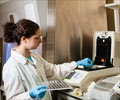A leading scientist has voiced concern against the influx of many companies offering ‘at home’ genetic tests for disease risk, and believes that such marketing may still be premature.
Dr. Kenneth Offit, MD, MPH, Chief of the Clinical Genetics Service at Memorial Sloan-Kettering Cancer Center (MSKCC), has said that these ‘at home’ genomic tests, while considered advantageous may also have its shortcomings.'Health professionals are now faced with the prospect of their patients coming to the office, a DNA profile in hand, asking for preventative management tailored to their specific disease risks,' he said.
Recently, more than two dozen companies have been marketing a range of genetic tests directly to consumers concerned about genetic conditions. These conditions include those related to risks for disease, other genetic traits, and ancestry. In fact, many companies have marketed 'whole genome scans,' offering assessments of risk for various health conditions ranging from the type of earwax an individual forms to his or her risks for diseases including cancer, diabetes, and blindness.
To this, Offit has offered several caveats and recommendations for helping doctors and counsellors while they contemplate offering these research-based tests in clinical practice.
Dr Offit has raised concerns about the scientific accuracy of some of these tests, because 'they have not yet been validated in forward looking (prospective) clinical studies.' He also said that the laboratory accuracy of these tests also may vary.
Secondly, he said that the 'direct to consumer' aspect of the marketing of these tests, eliminate guidance from healthcare professionals, which limits the sources of information available to consumers about these tests and their accuracy from those marketing the tests.
Advertisement
In addition, Offit also expressed apprehension that once these self ordered test results are transmitted, individuals receiving the results may not also receive counseling regarding appropriate medical interventions for prevention and early detection of genetic disorders. He reminded that certain state health departments, like in New York, have indicated that genetic testing for disease risk must be requested by a licensed healthcare professional and must be performed in an approved clinical laboratory.
Advertisement
Being on of the flag-holders of the clinical introduction of genetic testing for breast and colon cancer over the past decade, he argued for the cautious introduction of new 'whole genome' testing, preferably in the setting of ongoing clinical trials.
'Those of us in the field of genetic testing for cancer risk proceeded cautiously…The same approach should be followed for genomic testing for other disease risks. Not doing so runs the risk of dangerously reassuring some and needlessly worrying the already worried well,' he said.
His views are published in a article in the special genomics issue of the Journal of the American Medical Association.
Source-ANI
SPH/L











